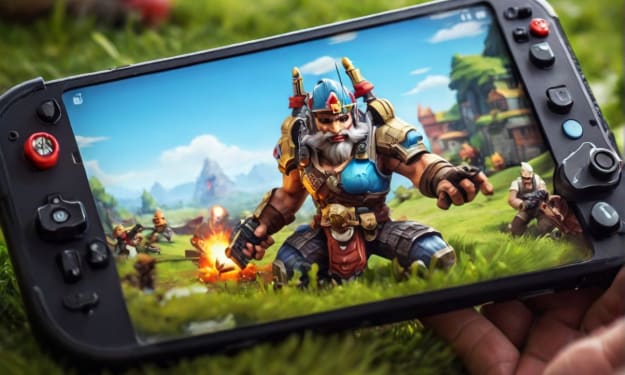Oh, the Places You'll Play
The evolution of escapism: a life in games

One of the most powerful features of video games is their ability to let you inhabit new worlds. Games aren't just fun pastimes, they're places that we go. Whether the grounds of The Mushroom Kingdom, the Hills of Hyrule, the Depths of Brinstar, or the streets of Los Santos, the memories made in video games can be as real as any others.
Of course, time spent in video games is no simple substitute for time in the real world. But it's not every minute of every day we get to spend out with friends or making a living or in class learning. On rainy days or on stressful ones, during sweltering summers and frigid winters, these virtual universes are prodigious tools of escapism. And when I look back on my early years, I'm thankful that they were filled with these colorful little escapes.
My first exposure to video games was at a time when they'd only just begun progressing beyond 2D planes with simple soundtracks and monotonous pings. Of course, even back in the days of the first Atari consoles, people still found ways of getting lost in their games. There was no sudden moment at which these simple computer programs bridged the gap and began to feel like fully realized worlds.
Back in the days of Pong, there were few who envisioned that blocks on screens would one day grow into grand domains equipped with valleys, rivers, trees, and creatures. When I was a child, the animations in my games weren't quite good enough to convince me they were real landscapes I was exploring. But the blocky polygonal worlds of the 90s were escapes, no less.
In the decades since, though, an entire subset of games have released that are so realistic they can fool the eye and so expansive they would require years to explore in their entirety.
So now when I look back over the games of my life, I'm reflecting on a wide array of places traveled. When I consider the memories of my life, I don't regret the ones that were made in these varied, cartoonish worlds.
Thinking back over my childhood, the caterpillar hunts and tree-climbing and twig-collecting were hardly less formative than the 3D environments of Super Mario 64. From the first time I tossed King Bob-omb to the unease I felt ascending Bowser's infinite staircase, these virtual planes have instilled in me some of my most core memories.
There's the memory of my father helping me to set up my first home console - the Nintendo 64. And then there's the memory of him trying his best to keep up with me as I rapidly improved at Mario Kart 64; I was a true child of the digital age.
I remember Banjo Kazooie and its sequel, and all the wonderful, whimsical worlds they were home to - from flying over the giant snowman of Freezeesy Peak and the deserts of Gobi Valley to trudging through swamps and tiptoeing through the yards of a haunted church. I still hear all of the melodies of each environment echoing through my head - the ones that pinged softly through icy caverns to the ones that soared boisterously over forbidding lava lands.
I had a Game Boy that travelled with me nearly everywhere. I remember being ushered through an airport on the plane ride home from Jamaica, yellow Game Boy Color in hand and Super Mario Land dancing across its dimly lit screen. The game was seven years older than I was, and had already celebrated its tenth birthday by the time I discovered it. But clicking feverishly away and watching pixels bounce faintly, I could have hardly cared less when the game came out, or how many times it was played and beaten before it found its way into my hands. With eyes glued to the screen, my parents guided me toward the taxi ride home. It was around then that its battery died a tragic death.
When I think of my later childhood, the memories of fun outside with friends are coupled with the time that we spent indoors playing videogames. I remember yelling at the top of our lungs and crowding tiny TV screens whenever games grew competitive.
I remember that fateful Christmas that changed everything: the one where the Nintendo GameCube arrived into my life. It was a bundle that came equipped with Mario Kart Double Dash. But my dad had secretly talked to a babysitter of mine about what additional GameCube games a kid might need to achieve proper childhood ecstasy. So equipped with the knowledge of a teenager, my father guaranteed that that winter would be one of Super Smash Brothers, Simpsons Hit and Run, Super Monkey Ball and Mario Sunshine bliss.
And now when I look back on ages 9–12, the memories of action figures, camp and cops and robbers games are coupled with button-mashing brawls in Super Smash Brothers Melee, comical explorations of Springfield, and jumping through a tropical paradise with my favorite plumber in red.
When I was a little older, I remember when Wiimotes began swinging through living rooms. I remember when my dad drove me to a nearby shopping mall on the blisteringly cold early morning of November 19, 2006 to get a Wii - the very day that it launched. It took a good few months of begging, pleading and arm-twisting, but he eventually succumbed. After all, the Wii would mark Nintendo's groundbreaking foray into the realm of motion controls. "Even Pop-pop and Grammy could play Wii Tennis with us!" I'd gleefully remind him.
Through the end of my elementary school years and the beginning of my middle school years, the mental still frames of first crushes, school rumors, and unrestrained classroom shenanigans sit alongside memories of swatting Wiimotes back and forth in high-octane battles of Wii Sports boxing. They're on the mental shelf beside happy memories of my controller in hand - safety strap hanging at its side in wanton disregard - as I'd bend, lift, twirl, and twist in whatever erratic way that Wario Ware demanded.
I remember tilting it from side to side as I guided Tony Hawk down the hills of Machu Pichu, shaking the little white remote furiously as Mario soared through the galaxy, and pointing it patiently in Wii Play fishing.
Throughout high school, video games weren't a part of my life as much. But by the time I picked up a controller again in college, the virtual worlds from a few years prior had suddenly grown real enough to get hopelessly lost in. To memorize the map of any modern Grand Theft Auto game is to learn to navigate nearly as many turns, highways and boulevards as most modest cities. To understand the ins and outs of any open world RPG game today is to spend time in environments so authentic-seeming that it practically boggles the mind.
I remember playing through The Last of Us series during the height of Covid and sweating with terror at the ensuing hordes of zombies bearing down on me. The Rat King boss fight in The Last of Us 2 stands as the most petrifying virtual experience of my life. Throughout the game, I remember reveling equal parts in the breathtaking visuals, and the thought of just how much worse pandemics could be. The story, too, was unlike anything I'd ever witnessed before within a video game - fully warranting the show that HBO went on to make from it.
I remember playing Ghost of Tsushima a few months later and feeling one with a samurai in 1200's Japan. I remember riding horses through peaceful forests that were utterly alive in their colors and textures. I remember feeling the draw of the bow vibrating intricately through the controller in my hands as I'd aim it toward the enemy camps of Mongolian invaders.
I remember playing Zelda: Breath of the Wild and being floored by the level of detail and interactivity within the world. And its sequel, Zelda: Tears of the Kingdom, has only further expanded on it - achieving what so many in the gaming community felt was simply impossible. Each mountain in the distance can be accessed, and scaled. Each crevasse can be explored, and every chasm descended into. Almost every single facet of the environment has a purpose, and fifty clever ways of discovering what exactly it is. The critical thinking that video games require is something that often goes unappreciated by those who've never played them.
It's not everyone who's better off playing video games on a couch than spending time in the world around them, but nor is it everyone who can. As the video game industry has advanced, so has assistive technology. Now, profound worlds of every variety are open to even those whose bodies couldn't handle them in real life. Whether infirmed and in a wheel chair, or elderly and in pain, video games have a surprising amount to offer.
In confronting my own seasonal depression, video games have been an extraordinary tool. Games and virtual reality have grown so realistic that time spent wandering through these virtual landscapes is enough to actually trick the brain into believing it's getting more sunlight. In those darkest months of the winter, the ability to get lost in brighter virtual worlds is a reprieve that not many even consider.
Video games have transcended the realm of mere entertainment, becoming avenues of memory, experience, and connection. Whether as a means of escape, a tool of inclusion, or a canvas for creativity, these games enrich our lives, and remind us that adventures can be found both outside our doors and within the sprawling virtual worlds of the modern age.
About the Creator
Ben Ulansey
Ben is a word enthusiast who writes about everything from politics, religion, film, AI and videogames to dreams, drones, drugs, dogs, memoirs, and terrorizing Floridians with dinosaur costumes.






Comments
There are no comments for this story
Be the first to respond and start the conversation.